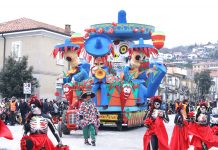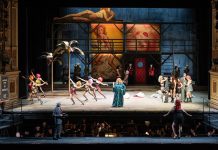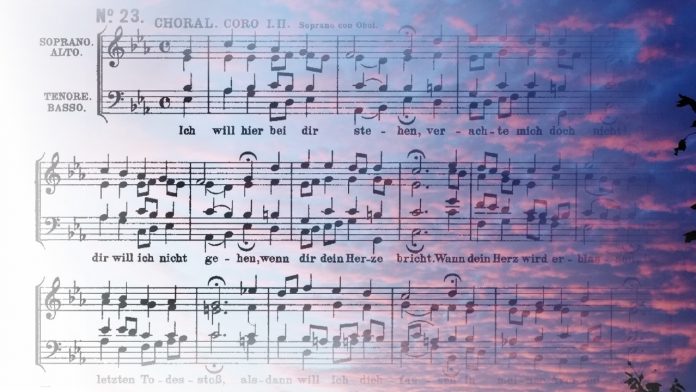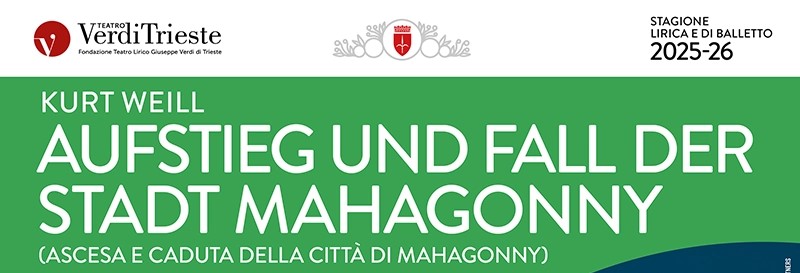by Rita Siligato
“Ich will hier bei dir stehen…”
“It’s not easy to pronounce, don’t you think?”
“You have to reflect on the meaning, it’s lovely… Here would I stand besides thee…”
The funny boy with a head of dark hair and the high-pitched tenor voice was standing in front of her.
The curly boy had to turn his head and look up towards her, because she was almost perched on a step, just over the best singers, the soloists. From above, she could see their nape. She was only the last choir girl, a recruit. Redenta was a contralto, she had a husky deep voice and an almost perfect pitch. She still had to learn how to breathe between the singing parts. She was untrained, but she was eager to learn.
She tried to be witty, smiling at his nape: “I will learn German, at least!”
He turned again, looking at her with his dark eyes. She noticed they were almost black.
“Shush, now. The Maestro is very short tempered. If he hears someone talking during the rehearsal…”
The Verdi theatre was a stunning place to be, for Redenta. Her friend Klara told her, a few months before, that the choir needed new singers: Klara was a soprano, and the two girls sang together in a small choir at the Chiesa del Rosario.
“You just have to pretend you can read a score properly, Redenta! You are a fast learner, and you have a good ear.”
She was just beginning to understand how to read a score: it was not difficult, you had to listen to the others singing and go along with the music, following the peculiar signs on the page.
At the rehearsal that evening the singers were settled on the stage, standing precariously on narrow temporary benches painted black. The Maestro told them that for the proper concerto the choir will be positioned on a kind of staircase shaped like a semicircle: it was still to be set up.
But the lights were wonderful, the red velvet of the theatre hall was new and inviting. And all that gold around!
“Boys, girls, from bar one of the chorale!”
“Ich will hier bei dir stehen…”
They sang it seamlessly, and the Maestro smiled.
“Enough for tonight. I will see you tomorrow at seven, be here on time, better five minutes earlier… good night!”
The chorists gathered under the arches outside the theater, squinting in the poor light of an April evening. A boy lit a cigarette, scorned by an old basso that said: “You pretend to be a tenor, and tomorrow you will be a basso like me!”
The young curly soloist was standing alone, humming by himself. Redenta linked arms with Klara and approached him.
“Do I know you?”
“Do I?”, said the boy. “Of course we know each other, you are the girl learning German!”
“You look familiar. I saw you before.”
“Think again, girl.”
He left without turning, and the two girls looked at each other, puzzled.
“I am sure I saw him before. Let me think…”
Going to work in the morning, she almost collided with the dark eyed boy.
“Do you live here? In Cavana?”
“Yes. And you?”
“Me too! This is where I saw you before then.”
“I moved here a month ago, I lived in Gretta before. But I used to be here a lot, when I was a child. Maybe we played together…”
“Sorry, I am late for work. I have to run!”
Redenta was really sorry, because she wanted to know something more about this boy. She could not remember him as a child, or… Yes, little Dario! He used to play with the youngest boys! When she was fourteen, he was running around with the other children, a slender child, tanned and ruffled, always singing, always up to something. She was already dreaming of the dancing hall with her sister Marina back then.
“See you at rehearsal tonight, girl!”, shouted the boy at her back.
Her eldest sisters were already married, all of them. Nella was in Liverpool with Harry, who came back from Korea unharmed, and Redenta was an aunt now: she had a niece called Rachel, a blonde plump baby she saw only in photographs. Ondina met a baker and married him after a swift courting, lasting less than a year.
Marina went dancing a couple of times at the old ballroom, feigning boredom, and in the end married her childhood sweetheart, Guerrino, a good for nothing boy with a burnished head of red hair.
Redenta was always the baby for her mother. She never went dancing because her mother still believed she was too young – at twenty – to go dancing by herself. It was a blessing when Klara asked her to join the choir at the Chiesa del Rosario.
“You are Dario!”
“Shush! Rehearsal time! We may talk later!”
They sang the chorale and all went well, in a smooth performance. Redenta was getting the hang of the score.
Klara was winking at her from the soprano bench. When the Maestro told them: “See you tomorrow evening, for the run-through,” Klara left waving enthusiastically at Redenta: “You will have company, tonight! See you tomorrow!”
Redenta stepped outside the theater, under the arches. It was raining, a soft spring rain. The piazza was a sea to cross, heading to Cavana.
“Do you want me to walk you home, girl?”
“Thank you, Dario.”
He brandished an enormous umbrella over her head.
“I am Redenta.”
“I know, girl. Please, stay closer. Let’s walk arm in arm, or you’ll be drenched in a moment.”
It was sweet to walk with him, standing beside him, as in bar one.































Ogni frammento della storia dei due protagonisti genera curiosità; mi viene voglia di sapere come continuerà! Dalla prima volta che li abbiamo conosciuti come due vecchietti teneri e arzilli, li troviamo ora all’inizio della loro conoscenza…come nascerà il loro amore?…
Complimenti a Rita!